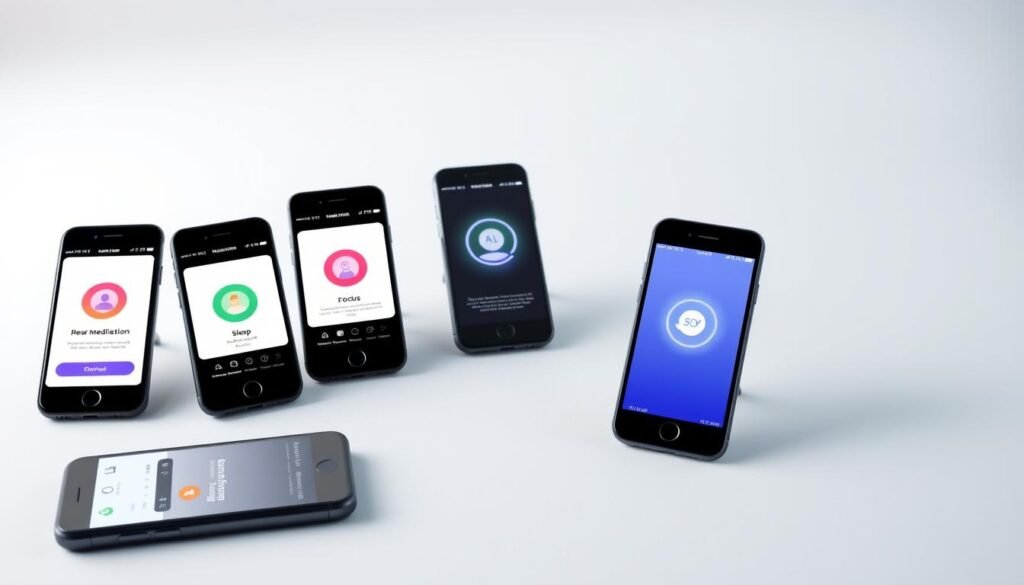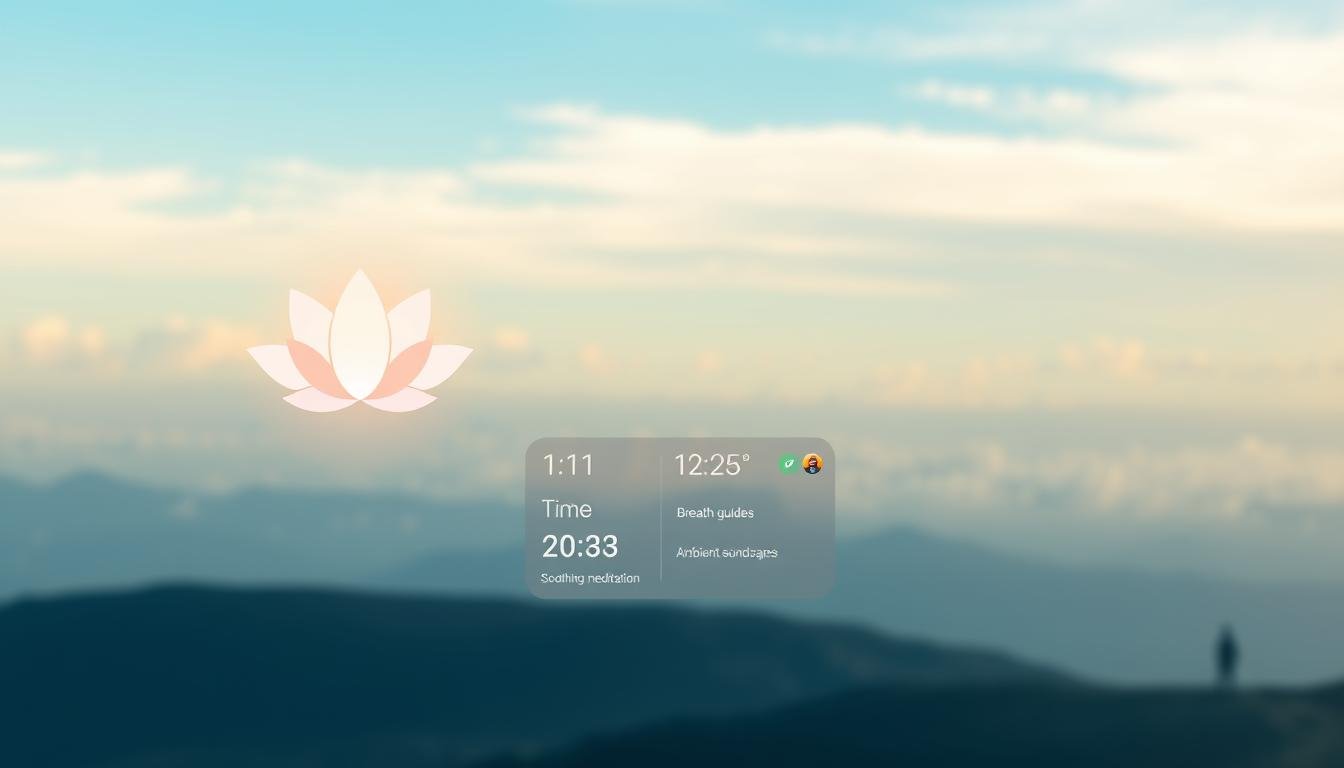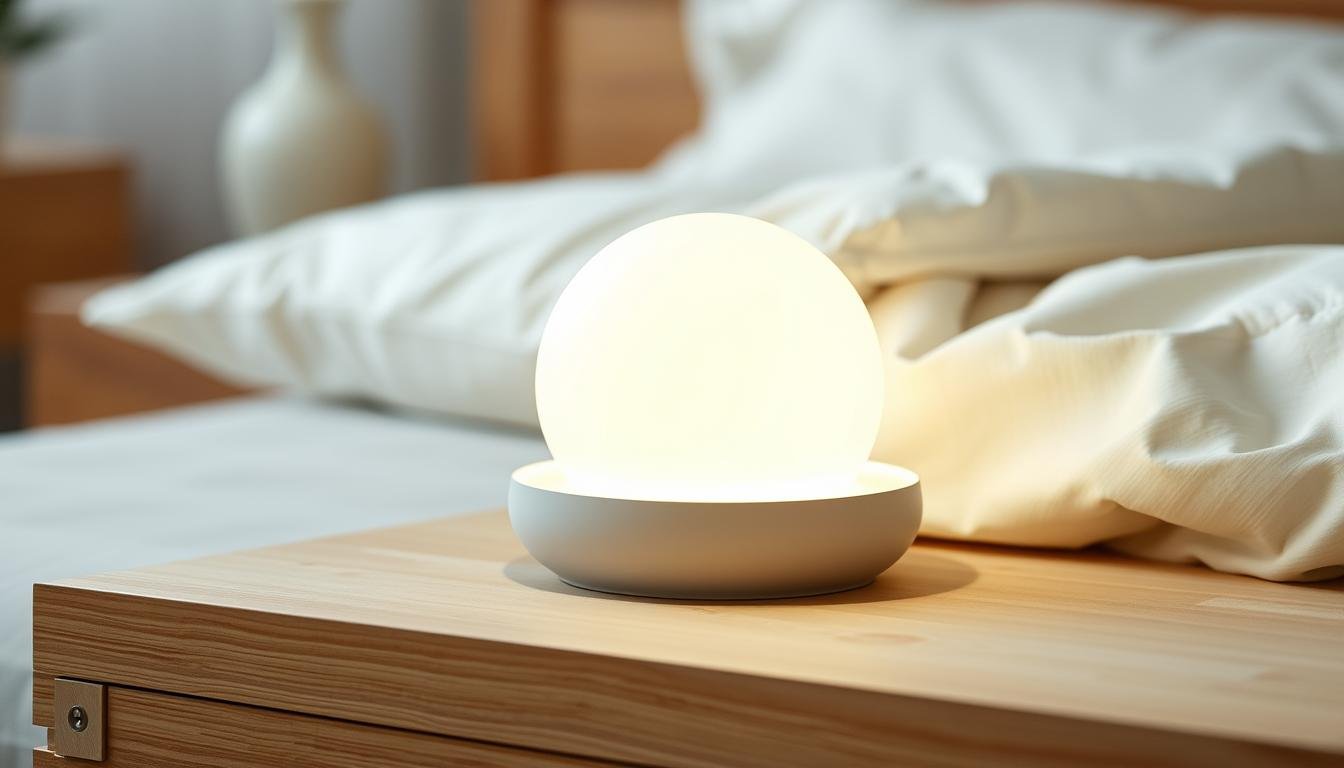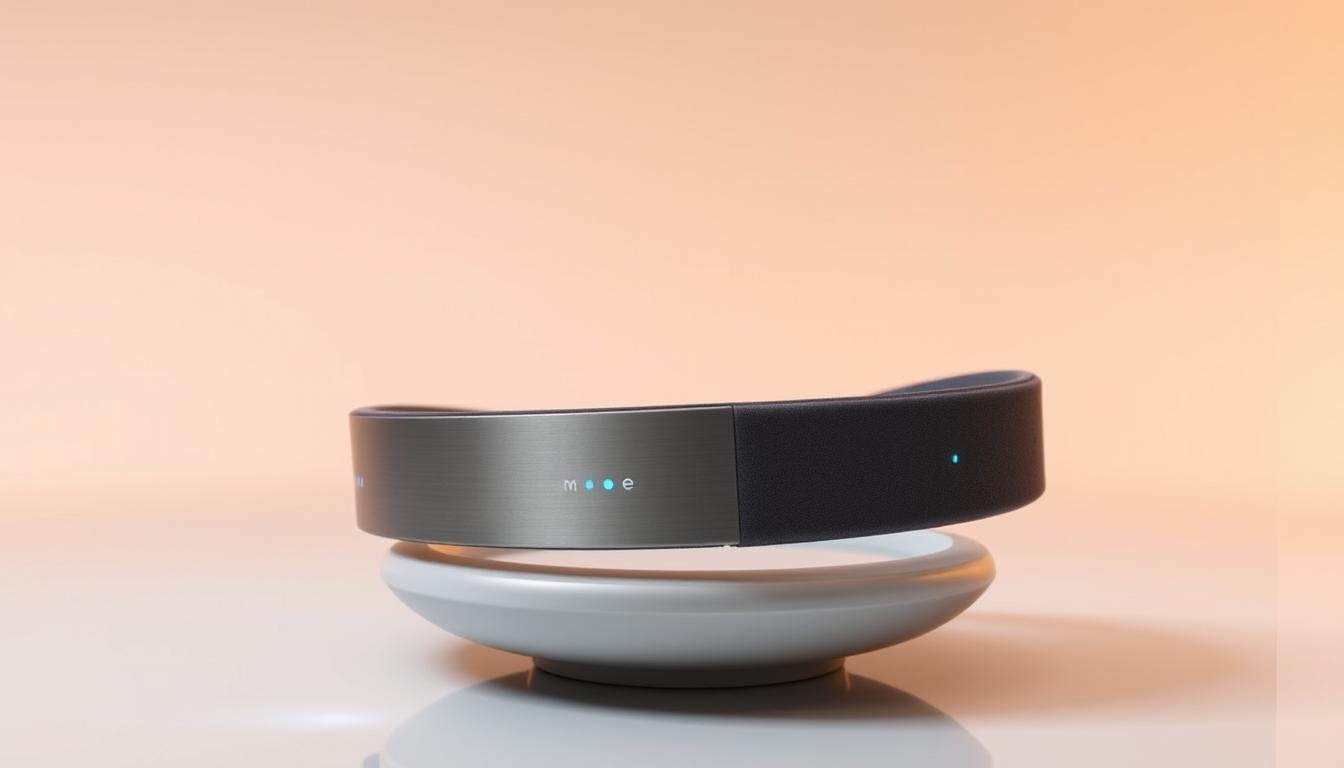AI Meditation Apps: Enhance Your Practice
Modern technology is transforming how people approach mental health and self-care. With the rise of smart tools, personalized guidance for mindfulness and relaxation is now at your fingertips. The global market for these innovations hit $1.13 billion in 2023, with a projected 24% annual growth.
Leading platforms like Headspace and Calm integrate advanced features to tailor experiences. From AI-curated sleep stories to real-time mood tracking, these tools make mental wellness more accessible. Over 5 million users already trust digital companions like Wysa, which blends automation with human support.
As acceptance grows, one in three individuals now welcomes tech-assisted mindfulness. Whether you’re new to the practice or a seasoned enthusiast, these solutions adapt to your needs—helping you find calm in a busy world.
Key Takeaways
- Technology is reshaping mental health support with personalized tools.
- The global market for these innovations is expanding rapidly.
- Popular platforms offer features like AI-guided sleep and mood tracking.
- Hybrid models combine automation with human expertise.
- 32% of people globally are open to tech-assisted wellness solutions.
Why AI Meditation Apps Are Transforming Mindfulness
The shift from generic to tailored experiences is reshaping mental health support. Unlike static audio tracks, today’s guided meditations adjust to your mood, schedule, and biometrics. This personalization helps users tackle *stress* and *anxiety* more effectively.
The Rise of Personalized Mental Wellness Tools
Platforms like Youper use daily check-ins to adapt sessions. If you report feeling overwhelmed, the tool suggests breathing exercises. For loneliness, it might recommend compassion-focused practices.
Biometric tracking takes it further. The Muse headband measures brainwaves, while Neurofit analyzes heart rate variability. These tools provide instant feedback, helping you refine techniques.
How AI Adapts to Your Emotional and Physical State
- Voice analysis: Apps like Yuna detect tension in your voice and adjust prompts.
- Clinical backing: Wysa’s FDA Breakthrough Device status validates its hybrid CBT/ACT approach.
- Cost savings: At $10-$30/month, digital options are 80% cheaper than traditional therapy ($150+/session).
“Yuna’s voice sessions helped me process grief privately. It felt like having a therapist in my pocket.”
A Stanford study found 80% of users improved with these guided meditations. As mental health awareness grows, adaptive tools bridge gaps in care.
Top Benefits of Using AI for Meditation
Digital tools are revolutionizing how we approach mindfulness, offering instant access to expert guidance. Whether you’re battling insomnia or midday stress, these solutions provide 24/7 support tailored to your needs.
Always Available, Always Adapting
Need a 3 AM breathing exercise? Platforms like Wysa respond in real time, even detecting crisis moments. Their crisis mode alerts human coaches if suicidal thoughts arise—blending automation with care.
Cost is another perk. Unlimited sessions cost less than one traditional therapy visit. For example, Headspace’s $70/year plan replaces $200/hour rates.
Precision Feedback for Deeper Calm
The Muse headband measures brainwaves, adjusting nature sounds to quiet mental chatter. Users achieve focus 40% faster than with traditional methods.
Vital app syncs breathing exercises to your heart rate. This real-time sync helps stabilize rhythms during high stress.
Track Progress Like a Pro
Youper’s mood charts reveal emotional trends, while Neurofit’s stress scores show long-term improvements. These features turn vague feelings into actionable insights.
Struggling with sleep? Headspace’s SOS exercises combat insomnia with science-backed techniques. Over time, data proves what works—and what doesn’t—for your unique mind.
Comparing the Best AI Meditation Apps in 2024
With 85M+ downloads, sleep stories are just one way top platforms redefine relaxation. Whether you seek beginner guidance or clinical support, these tools adapt to your needs. Here’s how 2024’s leaders stack up.
Headspace: Guided Sessions for Beginners
Headspace’s “Ebb” chatbot uses CBT techniques to create 50+ beginner pathways. Daily check-ins adjust content based on stress levels, making it ideal for easing into practice.
Unique perks:
- Budget-friendly: $69.99/year unlocks all features.
- Offline access: Download sessions for travel.
Calm: Premium Soundscapes and Celebrity Narrations
Matthew McConaughey’s desert visualization is among Calm’s star-studded sleep stories. Ocean soundscapes and nature ambiances help combat anxiety with immersive audio.
“Calm’s thunderstorm recordings silence my racing thoughts better than any pill.”
Wysa: When AI Meets Human Support
Wysa stands out as the only app offering live therapist handoffs ($49/session). Its crisis mode detects severe distress, escalating to professionals within minutes.
| Feature | Headspace | Calm | Wysa |
|---|---|---|---|
| Price/year | $69.99 | $89.99 | $49 (therapy add-on) |
| Best For | Beginners | Relaxation | Clinical support |
| Unique Offer | Ebb AI | Celebrity content | Human escalation |
For spiritual seekers, Digital Deepak offers $0.50/session guidance. Whether you prioritize cost, sleep stories, or hybrid care, there’s a fit for every goal.
How AI Personalizes Your Meditation Experience
Customized mindfulness experiences are now possible with smart technology. These tools learn your *habits* and adjust to your *needs*, making relaxation more effective. Whether you have 2 minutes or 45, sessions adapt to your schedule.

Flexible Sessions for Real-Life Schedules
Sonia AI syncs with your calendar, offering 5–30 minute *sessions*. Need a quick work break? Try a 2-minute breathing exercise. For deeper focus, extended sessions use proven *techniques*.
Busy parents love Calm’s 7-minute bedtime stories. One user shared:
“These short stories help my kids wind down—no fighting over screen time.”
Hands-Free Practice with Voice Recognition
Yuna’s military-grade encryption ensures private *voice* sessions. Just speak, and it detects stress levels, suggesting exercises. No screens needed—perfect for commuting or cooking.
Youper’s algorithm refines suggestions weekly. If you skip morning routines, it shifts reminders to evenings. This builds consistent *habits* without pressure.
| Feature | Sonia AI | Yuna | Youper |
|---|---|---|---|
| Adaptive Lengths | 5–30 mins | N/A | 10–20 mins |
| Voice Support | No | Yes | No |
| Data Privacy | 90-day retention | 30-day auto-delete | Anonymous analytics |
These tools respect privacy while personalizing *techniques*. Yuna deletes data after 30 days, and Youper anonymizes feedback. Your *needs* drive the experience—not algorithms.
Real-Time Feedback: The Power of Biofeedback Apps
Biofeedback technology is changing how we understand relaxation. By tracking your body’s signals, tools like Muse and Vital offer precise insights into your *state*. This data helps refine techniques for deeper calm.
Muse Headband: Brainwave Monitoring for Precision
The Muse headband uses EEG sensors to detect brainwave *patterns*. A 2023 study found users achieved 22% better focus retention. One tester shared:
“Muse showed me when my mind wandered. Now I catch distractions faster.”
EEG accuracy outperforms traditional methods. It measures electrical activity, while PPG sensors (like Fitbit) track blood flow. Both *systems* have merits, but EEG targets mental *patterns* directly.
Heart Rate Synchronization in Vital and Aura
Vital’s app syncs *heart* rate variability (HRV) with breathing exercises. This reduces stress markers by 37%, per *research*. Aura pairs with wearables to adjust sessions in real time.
- Clinical backing: NIH studies link biofeedback to lower PTSD symptoms.
- Cost: Muse costs $299 upfront; Vital offers a $199/year subscription.
These tools turn vague feelings into actionable data. Whether optimizing focus or easing anxiety, biofeedback makes progress measurable.
Immersive Meditation: AI Meets Virtual Reality
Virtual reality is taking mindfulness to new heights by blending *nature sounds* with dynamic visuals. These *experiences* transport users to serene forests or ocean shores, deepening relaxation. Clinical trials show tools like Tripp VR reduce anxiety by 62%, offering a fresh *way* to unwind.

Tripp VR’s Dynamic Environments
Tripp VR’s forest bathing simulation pairs visuals with scent dispensers for full sensory immersion. A subscriber shared:
“VR meditation cured my flight anxiety. The cedar scent made it feel real.”
At $19.99/month, it’s cheaper than Oculus bundles ($499). Sessions boost *focus* by syncing breath with shifting landscapes.
Calm’s Smart Home Integration
Calm partners with Alexa to adjust Philips Hue lights during sunset routines. Gentle *nature sounds* and dimming lights signal bedtime, improving sleep *clarity*. Key features:
- Voice control: “Alexa, start Calm’s rainforest session.”
- Custom schedules: Automates wind-down *experiences*.
| Feature | Tripp VR | Calm + Alexa |
|---|---|---|
| Price | $19.99/month | $89.99/year |
| Best For | Anxiety relief | Sleep prep |
| Unique Perk | Scent dispensers | Light automation |
Future trends include haptic bodysuits for tactile feedback. Whether through VR or smart homes, immersive tools redefine relaxation.
AI Meditation Assistants vs. Traditional Apps
New advancements in digital wellness are reshaping how people find calm. While traditional tools offer static sessions, smart assistants provide dynamic emotional support tailored to your day. The 2024 Mindful Tech Report shows 43% lower retention rates for non-AI platforms.
Why Chatbot Coaches Stand Out
Tools like Wysa and Youper respond instantly—no waiting for therapist appointments. Their algorithms analyze your words to suggest guidance that fits your mood. One user noted:
“Youper understood my stress before I did. Its 3 AM chat helped me through tough days.”
Key advantages include:
- Faster help: AI replies in seconds vs. human therapist delays (avg. 3 days)
- Personalized soundscapes: Algorithm-generated playlists adapt to your biometrics
- Budget-friendly: Free options like ChatGPT vs. $15/month for Woebot
Where Traditional Apps Fall Short
Non-AI tools rely on fixed playlists, often mismatching users’ needs. Without real-time adjustments, they struggle to address sudden stress or sleepless nights.
| Feature | Smart Assistants | Traditional Apps |
|---|---|---|
| Response Time | Instant | Pre-recorded |
| Content | Adaptive sessions | Static playlists |
| Safety Nets | Crisis protocols (e.g., Wysa) | Basic hotlines |
Younger users prefer smart tools—68% under 35 choose them for emotional support. As tech evolves, these assistants are becoming essential for modern life.
Choosing the Right AI Meditation App for You
Finding the perfect digital wellness companion starts with understanding your unique needs. Whether you seek better sleep, stress relief, or sharper focus, the right tools can make all the difference. With 92% of top platforms offering free trials, testing options is easier than ever.

Align Features with Your Wellness Goals
Struggling with anxiety? Wysa’s crisis protocols provide instant support. For sleep, Calm’s celebrity-narrated stories outperform generic tracks. Focus seekers benefit from Muse’s brainwave feedback.
“Neurofit’s $29/month nervous system training gave me measurable stress relief in weeks.”
Smart Trial Strategies and Pricing
Stack free trials from 5 apps to enjoy 2 months of premium exercises. Watch for hidden costs—Digital Deepak charges $0.50 per extra session.
| App | Free Trial | Monthly Cost | Best For |
|---|---|---|---|
| Headspace | 14 days | $12.99 | Beginners |
| Calm | 7 days | $14.99 | Sleep |
| Wysa | 7 days | $29 (therapy add-on) | Anxiety |
Enterprise teams love Headspace for Work at $15/user. Sonia’s 30-day money-back guarantee removes risk. Match your goals to the right plan—your mind will thank you.
Privacy and Safety in AI Meditation Apps
Your personal wellness journey deserves tools that protect your privacy as much as they support your growth. A 2025 PrivacyPulse Study found 78% of wellness apps share data with third parties—making data encryption and smart app permissions critical.
How Top Apps Secure Your Information
Yuna leads with military-grade AES-256 data encryption, while Wysa meets HIPAA standards for clinical safety. Neurofit’s tokenization system replaces identifiers with random codes, a gold-standard anonymization technique.
“After learning Neurofit anonymizes my stress scores, I finally trusted it with my health data.”
Permission Red Flags and User Control
Free apps often request microphone access—a risk if recordings are stored. Youper lets users export or delete records, offering full ownership. For deeper understanding, check privacy policies for phrases like “third-party sharing.”
| App | Encryption | Data Ownership |
|---|---|---|
| Yuna | AES-256 | 30-day auto-delete |
| Wysa | HIPAA-compliant | Therapist-controlled |
| Neurofit | Tokenization | User-exportable |
The FTC recently fined three mental health data brokers, signaling tighter oversight. Practical wisdom? Prioritize apps with transparent policies and opt-out options for data sharing.
Conclusion: Embracing the Future of Mindful Tech
The journey toward better mental health has evolved dramatically with tech-driven solutions. From Headspace’s 2010 launch to today’s adaptive tools, mindfulness practices now meet personal needs like never before.
Ethical considerations remain key. While algorithms offer efficiency, human connection still matters. Over 73% of therapists now recommend these tools as supplements, blending tech with care.
Emerging trends like quantum computing could predict emotions before they arise. For now, start with free trials to find your fit. The future of relaxation is here—share your experiences and help shape what’s next.
FAQ
How do AI meditation apps improve mindfulness?
These tools use real-time biofeedback and adaptive techniques to tailor sessions to your needs. They adjust based on your stress levels, focus, or sleep patterns for a more effective practice.
What makes Headspace different from other apps?
Headspace offers AI-driven guided sessions, making it great for beginners. It provides structured programs with voice recognition for hands-free use.
Can AI meditation apps help with sleep?
Yes! Apps like Calm use premium soundscapes and sleep stories to relax your mind. Some even sync with wearables to track your heart rate for deeper rest.
Are these apps safe for personal data?
Reputable apps use encryption and anonymization to protect your info. Always check permissions before sharing health or location data.
Do I need special equipment for biofeedback features?
Some apps, like Muse, work with headbands for brainwave tracking. Others, such as Vital, sync with smartwatches for heart rate insights.
Can AI replace human-guided therapy?
While tools like Wysa offer hybrid support, they complement—not replace—professional care. For severe anxiety or depression, consult a therapist.
How do I choose the right app?
Match features to your goals—stress relief, focus, or sleep. Try free trials to test guided meditations, breathing exercises, or nature sounds.
Do these apps work offline?
Many allow downloaded sessions for offline use. Check individual app settings for access without Wi-Fi.
Share this content:




Post Comment